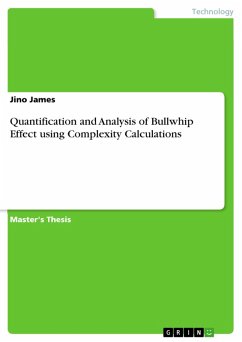Master's Thesis from the year 2020 in the subject Engineering - Mechanical Engineering, grade: 9.31, University of Kerala, language: English, abstract: Increasing demand from customers, high market competitions, fluctuating demand from customers and faster response, in addition to advancements in technology have turned the market into an unstable environment. All this conditions together creates a greater uncertainty in the supply chains and leads to the bullwhip effect phenomenon. It happens when the orders to the supplier tends to have larger variations than demands to the buyer such that the distortion propagates upstream in an amplified form. The major problems associated with the bullwhip effect are increasing the safety stock & carrying cost at each supply chain echelon, decreasing the customer satisfaction and inefficient production process at each echelon. So it is important to identify the bullwhip effect associated with the supply chain. One of the important step in analyzing the bullwhip effect is the quantification of bullwhip effect in an accurate way. Usually bullwhip effect is calculated as a ratio between order variance to the demand variance. This method is used by assuming that the variables in the data sets are independent and identically distributed. But in actual practice the data associated with the order and sales shows some kind of dependency within the data set. This independency is represented by a parameter known as Hurst exponent, which is identified by methods of rescaled range analysis, detrended fluctuation analysis (DFA) etc. A better method for the quantification and analysis of bullwhip effect is introduced in this paper by considering the independency of data set.
Dieser Download kann aus rechtlichen Gründen nur mit Rechnungsadresse in A, B, BG, CY, CZ, D, DK, EW, E, FIN, F, GR, HR, H, IRL, I, LT, L, LR, M, NL, PL, P, R, S, SLO, SK ausgeliefert werden.









